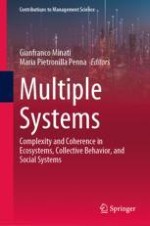2024 | OriginalPaper | Buchkapitel
Multiple Systems in the Meso Domain: A Study in Organizational Cognition
verfasst von : Davide Secchi, Rasmus Gahrn-Andersen, Maria S. Festila, Martin Neumann
Erschienen in: Multiple Systems
Verlag: Springer Nature Switzerland
Aktivieren Sie unsere intelligente Suche, um passende Fachinhalte oder Patente zu finden.
Wählen Sie Textabschnitte aus um mit Künstlicher Intelligenz passenden Patente zu finden. powered by
Markieren Sie Textabschnitte, um KI-gestützt weitere passende Inhalte zu finden. powered by
